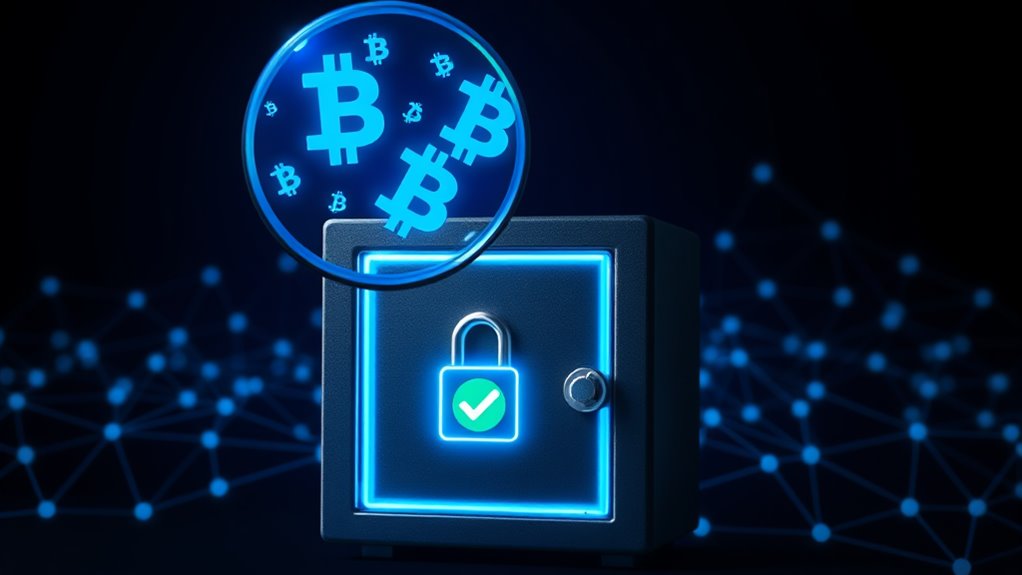Know Your Customer in Crypto
Note: This post may contain affiliate links, and we may earn a commission (with No additional cost for you) if you make a purchase via our link. See our disclosure for more info. The crypto world is constantly changing. This content is for informational purposes only and not financial, legal, or professional advice So, please verify the info on the cryptocurrency provider’s websites.
Know Your Customer (KYC) in crypto is all about verifying who users are. This isn't just a casual ask; it's a legal requirement. KYC helps to fight fraud and money laundering. Without it, crypto exchanges could be playgrounds for criminals. Not cool, right? Non-compliance? That means fines or getting shut down. Imagine running a business with a ticking time bomb. Companies that play ball with KYC can access serious growth. Stick around, and you might uncover why this matters.

In a universe where digital currencies are all the rage, the term "Know Your Customer" or KYC might sound like just another boring compliance buzzword. But in reality, KYC is essential for the crypto sector. It's the process that keeps exchanges from becoming playgrounds for fraudsters and money launderers. In fact, it's a regulatory requirement designed to verify users' identities and assess risks. The last thing anyone wants is their favorite crypto exchange turning into a haven for criminal activity.
KYC isn't just a suggestion; it's mandated by laws around the globe. The EU's AMLD6 and the U.S. Bank Secrecy Act enforce it. These regulations expect crypto businesses to play nice and follow the rules, or else face penalties. And let's be real—nobody wants to get hit with fines or shut down. Compliance isn't just about playing by the book; it's about keeping the whole operation afloat and building trust with users. The decentralized nature of cryptocurrencies creates unique compliance challenges for institutions trying to monitor transactions effectively.
KYC is a must, not an option; compliance safeguards crypto businesses and fosters trust in a volatile market.
The KYC process involves collecting personal data like names, birthdates, and addresses. Users submit government-issued IDs and proof of residence. Sounds easy, right? But it gets deeper. Customer Due Diligence (CDD) assesses risk factors like transaction volumes and trading behavior. For high-risk customers, Enhanced Due Diligence (EDD) kicks in. It's like a background check but for crypto. Thanks to technology, automated KYC tools can verify identities in mere seconds, significantly reducing the costs associated with manual KYC checks. Enhanced KYC helps ensure that exchanges maintain a safer trading environment by thoroughly vetting their users.
The benefits of compliance are clear. It reduces fraud risks, boosts investor confidence, and opens doors to partnerships with banks. Plus, it keeps the market stable.
But ignore KYC and face the consequences. Legal penalties? Check. Reputational damage? Double check. The crypto landscape is a wild ride, and without KYC, it's like driving without a seatbelt—risky and downright reckless.
Frequently Asked Questions
How Does KYC Protect Against Cryptocurrency Fraud?
KYC is the superhero in the fight against cryptocurrency fraud.
It's like a bouncer at a club, checking IDs and making sure only the right people get in. By verifying identities, KYC catches the bad guys trying to slip through the cracks.
It flags suspicious activity, sniffs out money laundering, and stops fraudsters in their tracks. No more pretending to be someone else.
Welcome to the world of accountability, folks.
What Documents Are Typically Required for KYC Verification?
When it comes to KYC verification, the document list isn't exactly short.
You'll need a government-issued ID—think passport or driver's license. Proof of address? Utility bills or bank statements are your best bet.
Oh, and don't forget the extra stuff, like Social Security numbers or tax documents. Sometimes, they even want to know your source of funds.
Because why not? It's all in the name of keeping things "safe." Fun, right?
Can I Use a Pseudonym for KYC Processes?
Using a pseudonym for KYC processes? Nope, not happening. Those days are long gone.
Regulatory bodies demand real names, addresses, and IDs—like, government-issued stuff. The whole point? To keep things legit and traceable.
So, if you're hoping to hide behind a fake name, think again. The system's designed to expose you, not protect your anonymity.
It's all about compliance now, whether you like it or not. Welcome to the new world.
Are KYC Regulations the Same Worldwide?
KYC regulations? Oh, they're a mixed bag worldwide.
Some places, like the EU, are all about strict rules and consumer protections. Others, like the U.S., are stuck in legal limbo, fighting over who gets to call the shots.
Meanwhile, Japan and South Korea have their own quirks, with registration and bans on certain coins.
It's a regulatory circus.
Bottom line? If you think it's uniform, think again. It's a global patchwork of confusion.
What Happens if I Fail KYC Verification?
Failing KYC verification? Well, that's like trying to enter a club with a fake ID. Spoiler alert: You're not getting in.
Users can't access services, and platforms might face legal headaches. Think lawsuits, fines, and a parade of angry regulators.
Oh, and don't forget the fraudsters who'll love your weak defenses. Basically, it's a mess. Trust? Gone. Revenue? Plummeting.
Good luck convincing anyone to trust your platform again.










